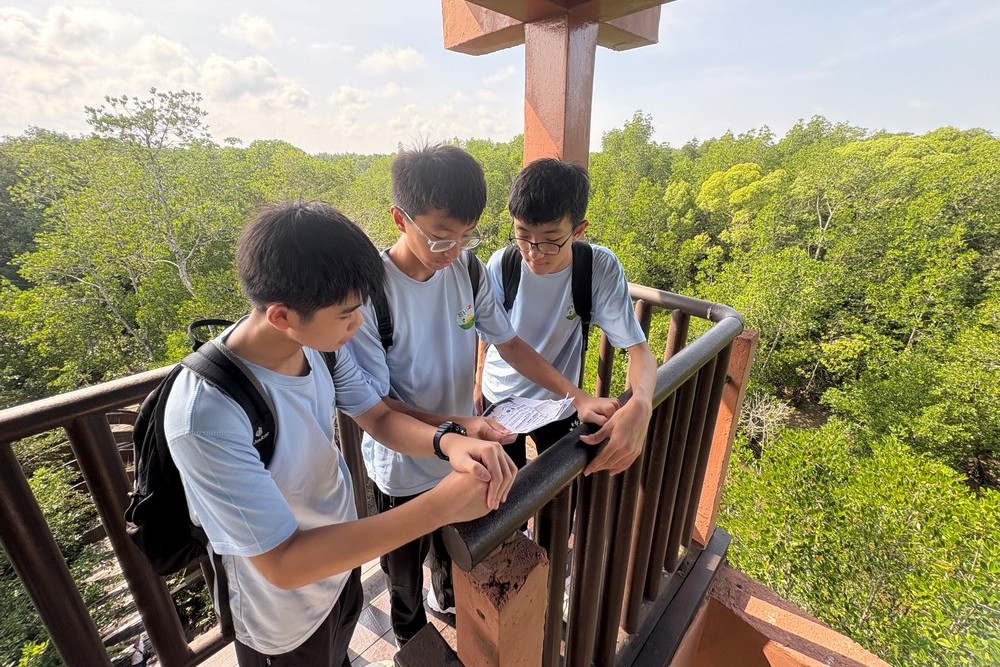 55 Tzu Shaos from Singapore, together with volunteers, ventured into Pulau Kukup National Park to explore nature through games. (Photo by Lee Sook Ching)
55 Tzu Shaos from Singapore, together with volunteers, ventured into Pulau Kukup National Park to explore nature through games. (Photo by Lee Sook Ching)
In 2025, students of the Tzu Chi Teenagers’ Class (a.k.a. Tzu Shao) crossed the Causeway and headed to Kukup Island, Malaysia, for a three-day and two-night camp.
"The theme of this year’s camp is ‘Growth Takes Flight’. We want the teenagers to learn, explore and grow in a nature. We also hope that the various programmes will enable them to discover their own strengths," said Fong Kok Kee, coordinator of the Tzu Chi Teenagers’ Camp. He added that this marked a breakthrough in recent years: for the first time, the camp was held outside Jing Si Hall, offering the Tzu Shaos an unconventional and immersive experience.
 The various organising teams enthusiastically introduce themselves to the Tzu Shaos. (Photo by Phang Wei Wan)
The various organising teams enthusiastically introduce themselves to the Tzu Shaos. (Photo by Phang Wei Wan)
From 20 to 22 June, 55 Tzu Shaos from Singapore left the hustle and bustle of Singapore's urban life and journeyed into the natural beauty of Kukup Island. Besides observing and identifying their own strengths and that of others, the teenagers also experienced spending the nights in nature and listening to its breath and sounds.
To tie in with the theme of the camp and the local ecology, much thought went into naming the individual groups. They chose animals and plants that are native to Kukup Island, such as silver storks, kingfishers, mudskippers, ospreys, ants, dragonflies, mangroves and swamp lilies.
 (Photo by Lee Sook Ching)
(Photo by Lee Sook Ching)
Distinguishing opinions from facts and living with confidence
"Pigs are stupid” – is it an opinion or a fact?" asked Ang Lee Kuan, a teacher from the curriculum team. In reality, pigs are highly intelligent animals, possessing cognitive abilities found only among the world's most intelligent species. They are also emotional, empathetic, and highly sociable.
Through guided discussions, Ang Lee Kuan led the Tzu Shaos to distinguish between opinions and facts and to learn how not to be easily influenced by others' words. "What someone says may be the result of their emotions at that moment, or may also result from one’s perceptions, rather than facts," she explained.
Firstly, Ang Lee Kuan asked the teenagers to write down what they found distressing and dreadful followed by group discussions on those words. Finally, she guided them to reflect on how they would comprehend and respond to the situations.
The Tzu Shaos engaged in a lively discussion around the topic, sharing their experiences and insights. Weng Yun Xi, a member from the Kingfisher group, said, "I learned how to differentiate between opinions and facts. Others may hold different opinions because people see things differently and have their own perspectives."
Khoo Jing Yue, from the Mudskippers group, said that angry words we speak without careful thoughts may hurt others, "So, we should think twice before we speak, and improve when we do wrong."
As night fell, the teenagers gathered after dinner to share their reflections under the tranquil stars. Dr. Chee Chen Sin from the curriculum team and some Tzu Chi Youths sang a few songs. Their voices drifted over the serene Kukup Island, accompanying the Tzu Shaos through their first night in the swampy surroundings.
Blending fun with education from nature
On the second day, it was not mobile phone alarms but the crisp, trumpet-like crowing of roosters that woke the Tzu Shaos, echoing like a rural symphony throughout the guesthouse. After breakfast, the teenagers changed into their camp T-shirt and boarded a boat from the guesthouse's pier to Pulau Kukup National Park for missions in the swamp.
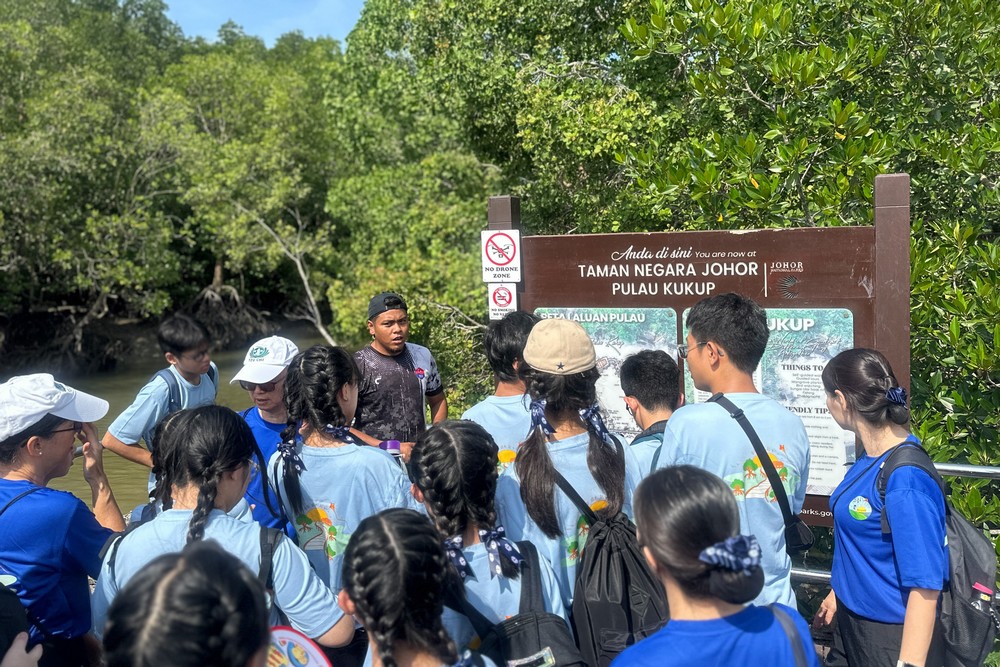 (Photo by Koh Kim Leng)
(Photo by Koh Kim Leng)
Before setting off, each group received a task card outlining their mission: to complete a series of challenges and solve intriguing puzzles. Besides testing their knowledge, their observational skills were also crucial. One task required them to photograph specific native animals of Kukup Island. As they engaged in their mission, the Tzu Shaos keenly observed the unique ecological landscape of the mangroves, seizing every opportunity to capture the target animals. Following the winding boardwalk through the mangroves, they embarked on an immersive journey of close-up exploration into nature’s wonder.
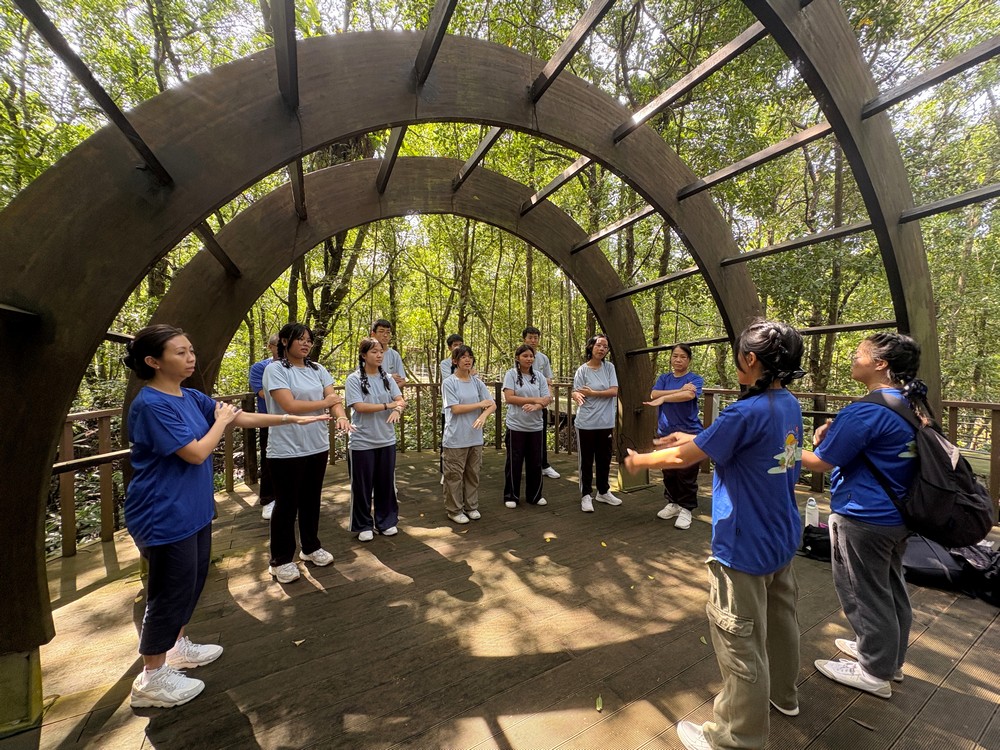 (Photo by Lee Sook Ching)
(Photo by Lee Sook Ching)
“When we were designing this programme segment, we realised that there are no mangroves in Singapore where we can create truly immersive experiences. We wanted to get the Tzu Shaos away from the city and into nature, to explore and enjoy the scenery that the mangrove swamps offer. That is why our entire design process revolved around the concept of mangroves exploration, with the journey taking place entirely within this unique natural ecology. We hope that this experience will be truly memorable, and that they can take some photos as keepsakes,” said Dai Xu An, the team lead in charge of the Tzu Shaos.
"Zhi Ming, we're heading to the next station!" the group facilitator called out to Tay Zhi Ming, a Tzu Shao who was still at the original spot. He quickly gripped his camera, peering through the viewfinder to find the swamp animal slithering through the mangroves in the distance. With a light click, the shutter echoed crisply in the silence, capturing a moment of nature at its most authentic.
Inspired by his grandfather and mother, Tay Zhi Ming (pictured below) loves nature and often explores various nature sites to photograph the ecosystems. Despite his smaller built, he has no trouble carrying the bulky and heavy telephoto camera. He excitedly shared, "I just captured photos of crabs, plants, and insects. Unfortunately, I didn't get any birds as the national park opens late, and the birds in the mangroves have already retreated to the forest in the mornings. But I caught a wild boar on the way back!"
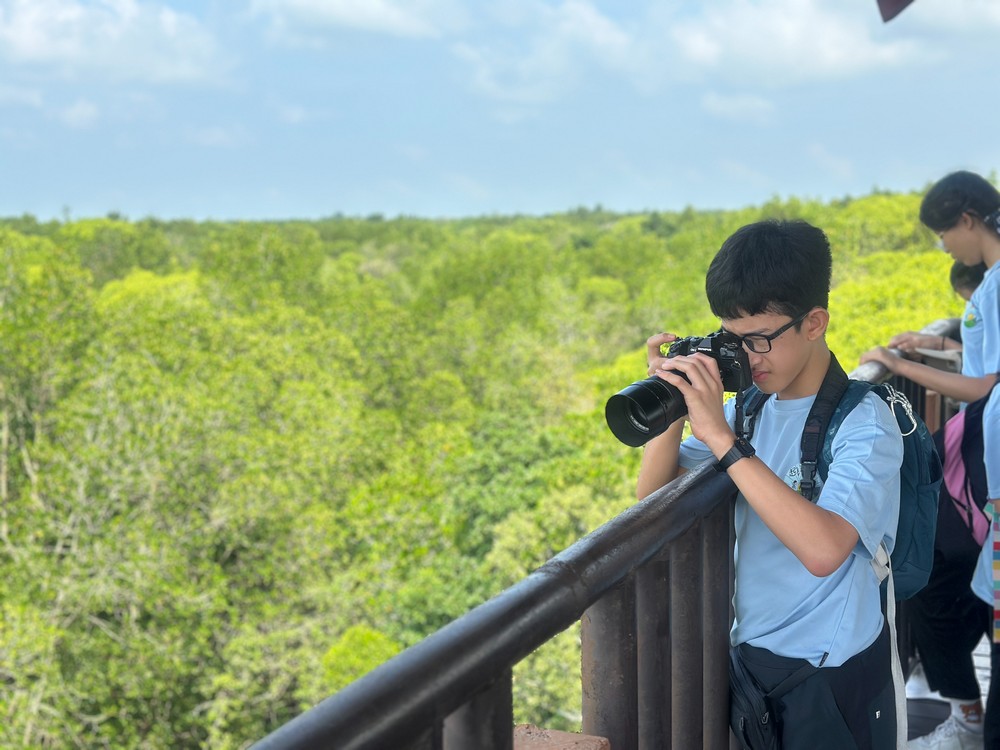 (Photo by Koh Kim Leng)
(Photo by Koh Kim Leng)
Ngiam Xin Ying, Zhi Ming’s mother and one of the organising members, to her bemusement, discovered during the trip that Zhi Ming had brought along his father's camera.
“Zhi Ming really enjoyed this Tzu Chi Teenager’s Camp. I also believe it is a great learning opportunity to get so close to nature which is difficult to experience in Singapore. On top of that, he made many new friends during these few days,” Ngiam Xin Ying beamed.
Balancing perspectives: Local development and coexistence
Back at the guesthouse, as they observed the modest living conditions of the residents and the fragility of the island's natural ecology, the Tzu Shaos found themselves deep in thought. For this session, the Tzu Shaos were split into four groups, each taking on the role of an investor, an urban planner, a fish farmer, and an environmentalist. They were tasked with discussing and presenting from their assigned perspectives, how to create jobs and improve the living standards of local residents, while also promoting biodiversity conservation and managing pollution.
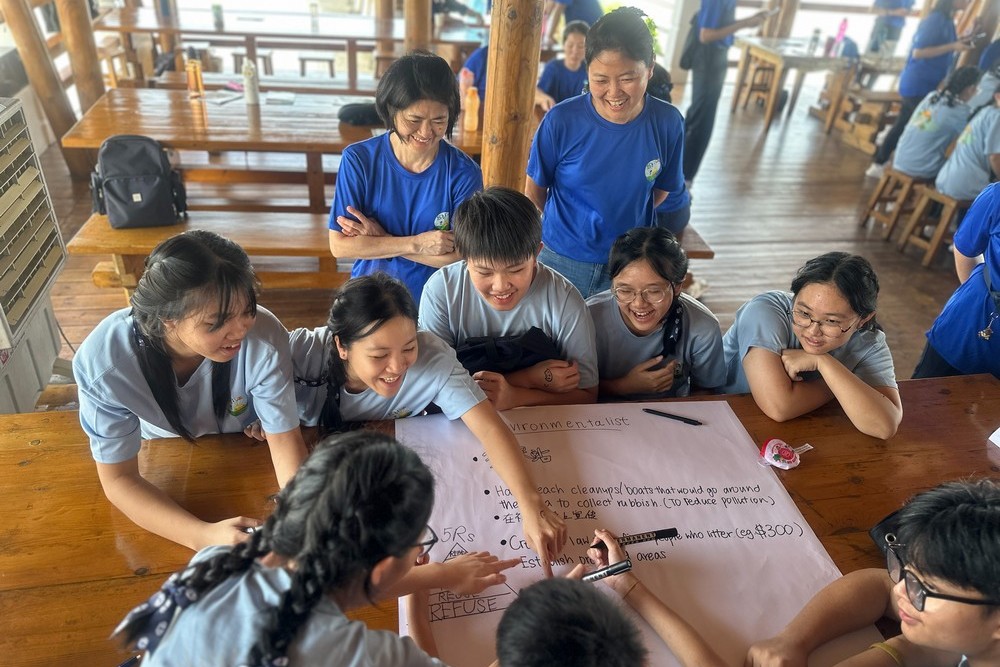 (Photo by Koh Kim Leng)
(Photo by Koh Kim Leng)
The four groups, representing diverse interests, engaged in lively discussions. The Tzu Shaos representing investors highlighted concerns about the ageing population and the trend of young people moving to cities for career development. They proposed strengthening Kukup Island's internet and communication infrastructure to promote its seafood industry through social media, thereby attracting attention to its potential. The Tzu Shaos representing environmentalists, having observed the heaps of garbage in the mangroves, suggested establishing recycling stations around the island. This would not only promote waste sorting but also encourage environmental protection.
Representing the fishermen, this group noted the impact of fishing on the marine ecology and proposed growing floating-leaf plants within the aquaculture area. These aquatic plants provide oxygen, allowing the fishery industry and the natural ecology to coexist. Finally, the group representing the urban planners hoped to attract investment to rejuvenate Kukup Island's eco-tourism industry, aiming to draw more interest in the island’s rich natural ecology and foster greater support for conservation.
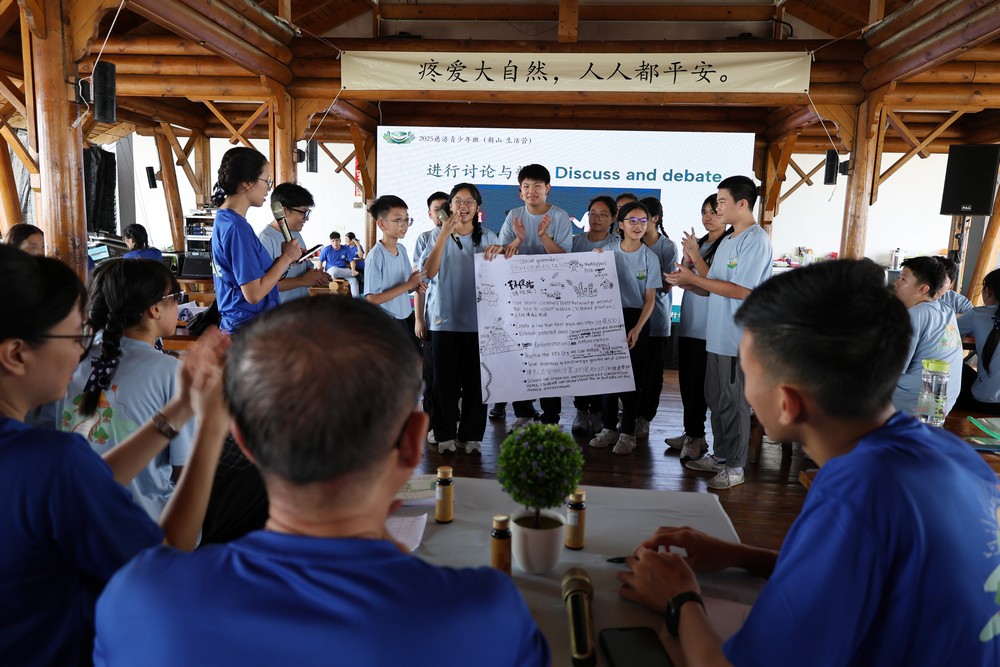 (Photo by Phang Wei Wan)
(Photo by Phang Wei Wan)
In addition, Tzu Chi volunteers Hong Jing Fang and Guo Wei Yu from Johor Bahru, Malaysia, who have extensive experience in serving the underprivileged, shared a local case study and engaged the Tzu Shaos in small-group discussions. "As a volunteer, how can you help them?" they asked.
After much deliberation and discussion, the Tzu Shaos proposed several comprehensive assistance plans, keeping the needs of the residents as the main focus. They suggested providing clothing, food, shelter, and transportation, as well as spiritual and emotional support and companionship.
Hong Jing Fang then gave a brief introduction to Tzu Chi's history. When asked who the first Tzu Chi home visit volunteer was, several answered that it was Master Cheng Yen. Hong Jing Fang shared with the teenagers the spirit of Tzu Chi's charitable work, from the initial needs assessment, regular care visits to ongoing support, charity is the foundation of Tzu Chi. She further emphasised that the mission of alleviating suffering and bringing happiness relies on the dedication of many committed individuals.
Three days and two nights passed quickly amidst a rich curriculum. Immersed in nature, the Tzu Shaos returned home reluctantly, carrying with them wonderful experiences and reflections. This unique camp experience empowered the budding youths with renewed strength and confidence to leap forward.
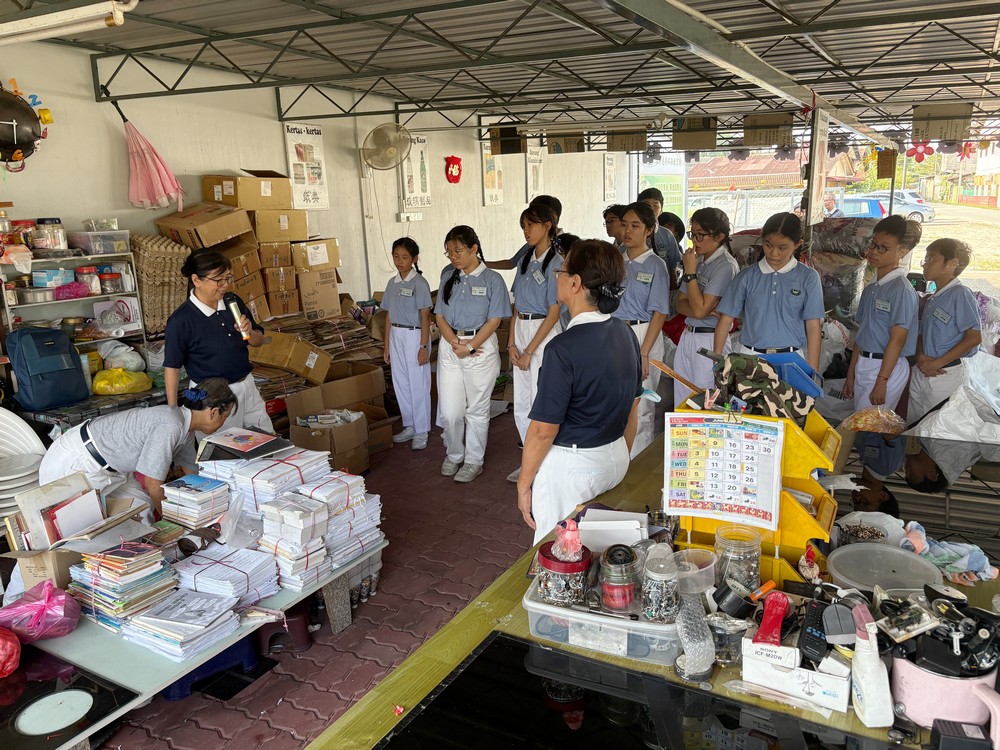 The Singapore team seized the opportunity for the Tzu Shaos to visit the Tzu Chi Pontian Recycling Station to learn about resource sorting. (Photo by Lee Sook Ching)
The Singapore team seized the opportunity for the Tzu Shaos to visit the Tzu Chi Pontian Recycling Station to learn about resource sorting. (Photo by Lee Sook Ching)
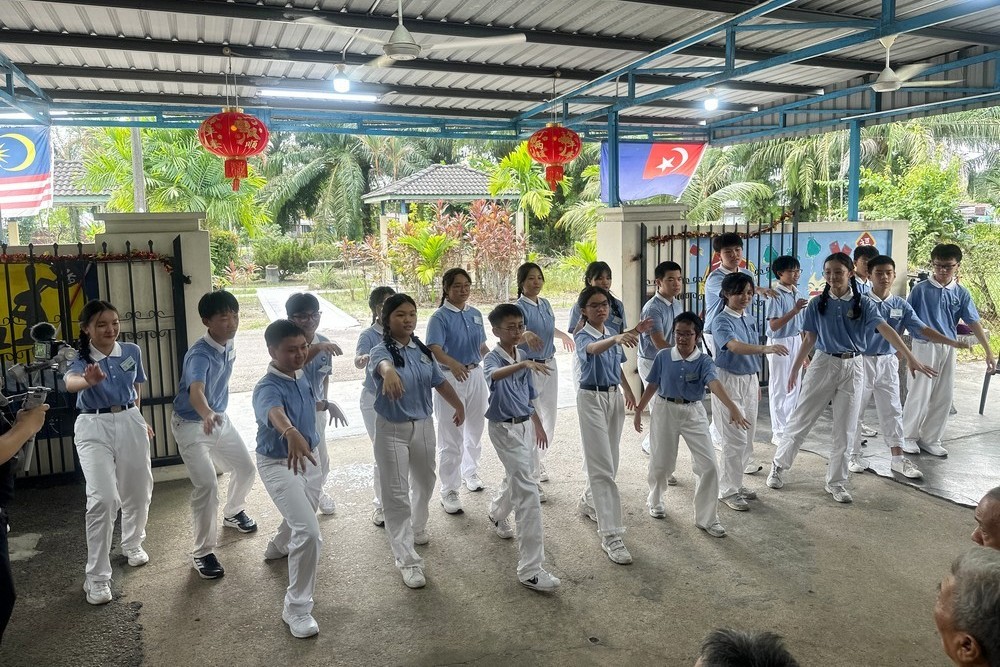 The Tzu Shaos also visited the Pekan Nanas Old Folks' Home, offered care, performed sign-language, and helped clean the residents’ living environment. (Photo by Koh Kim Leng)
The Tzu Shaos also visited the Pekan Nanas Old Folks' Home, offered care, performed sign-language, and helped clean the residents’ living environment. (Photo by Koh Kim Leng)



